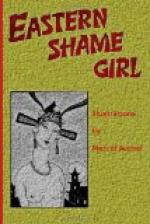For a little, Shih-niang refused. Then she looked at the moon, and a song escaped her. It was an affecting melody, taken from one of the pieces of the Yuan dynasty, called “The Light Rose of the Peaches.” In truth:
Her voice took flight to the Milky Way,
And the clouds stopped to listen.
Its echo fell into the deep water and
the fishes hastened.
Shih-niang sang. And in a near-by junk there was a young man called Sun; his first name was Fu, Rich, and his surname was Shan-lai, Excellent-in-Promise. His family was one of the wealthiest in Hsin-an of Hui-chow; his ancestors had owned the salt monopoly in Yang-chow. He was just twenty years old, and had moulded his character in accordance with his passion, being a regular visitor at the blue pavilions, where the smiles of painted roses are to be bought. He was making a journey, and had cast anchor for the night at Kua-chow. He was drinking in solitude, bemoaning the absence of companions.
Suddenly in the night he heard a voice more sweet than the sighs of the bird of passion, or than the warbling phoenix. No words seemed adequate, he felt, to describe the beauty of this song. Walking out from his cabin, he found that the music came from a junk not very far distant from his own.
In his eagerness to know who had enchanted him, he told his men to go and question the boatmen. But he learned no more than that the junk had been hired by Li Chia. He obtained no information concerning the singer. He reflected:
“Such a perfect voice could not belong to a woman of good family. How can I manage to see this bird?”
He could not sleep that night. In the morning, at about the fifth watch, he heard the wind roaring on the water. The light of day was strangely veiled by cloud, and flakes of snow were whirling madly. It has been said;
The clouds are swallowing
Countless thousands of trees upon the
hill.
Footprints disappear on many footpaths.
The fisher in the bamboo hat
On the frail boat
Catches only snow and the frozen river.
This snowstorm rendered it impossible to cross the river, and the boats could not be set in motion. Sun, therefore, told his rowers to leave his moorings and to make fast alongside Li Chia’s junk. Then, in a sable bonnet and wrapped in his fox-skin robe, he opened his cabin window, pretending to look at the white snow as it fell. Shih-niang had just arranged her hair, and, with her tapering fingers, was pushing back the short curtains to throw out the dregs of tea in the bottom of her cup. The freshened splendor of her rouge shone softly.
Sun saw that celestial beauty, that incantation; he scented that perfume; and his soul boiled over. For a long moment he gazed, and his spirit was as if submerged. But he recovered himself and, leaning out of the window, recited, nearly at full voice, the poem of the “Blossom of the Plum Tree”:




